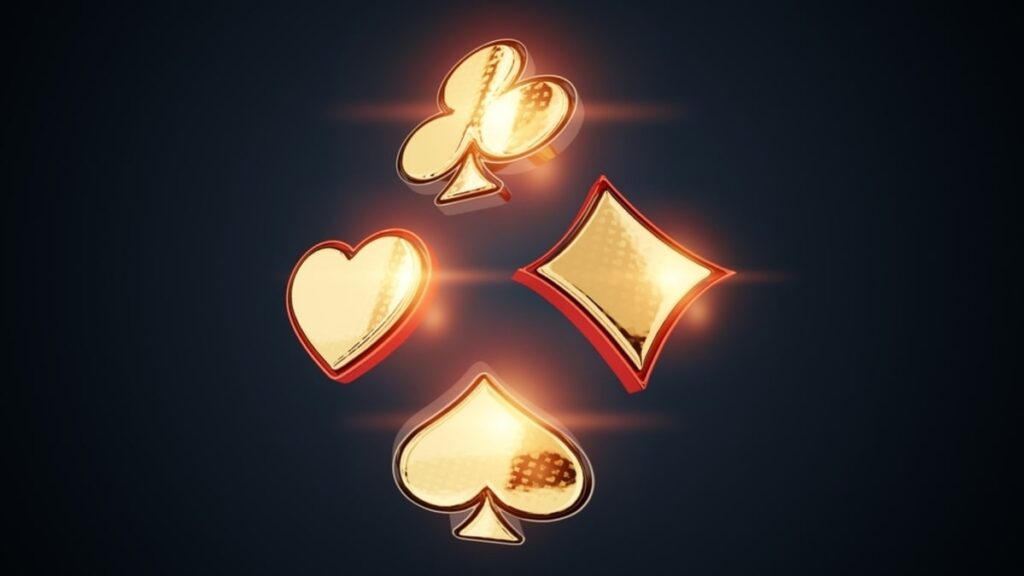Texas Hold’em Poker, as well as other popular poker games, are usually played with a traditional deck of cards. This deck is made up of 52 cards, split into 13 ranks and four suits.
While the importance of suited cards (cards of the same suit) cannot be overstated in poker strategy, the importance of suits is far less than some recreational players might assume.
That is to say, all poker suits have exactly the same value in the vast majority of situations. However, there are a few situations in which suits play a greater role than others, and as a poker player, you should be aware of them.
In this article, we will examine the various situations where suits play a role in poker and how they can influence the outcome of specific hands.
Ranking the Suits in Poker
In the intro, we said that poker suits all have the same value, but there are a few exceptions to this general rule.
We will cover those exceptions in the sections below, but before we do that, we must look at how poker suits are ranked.
Much like general poker hand rankings, poker suits are also ranked in a specific way. The suits are ranked by alphabetical order in the English language, from best to worst, as follows:
- Spades
- Hearts
- Diamonds
- Clubs
So, whenever a situation does arise where poker suits come into play, spades are always best, followed by hearts, diamonds, and finally clubs.
The truth is that even many poker dealers don’t understand this distinction, as the situations where poker suits are compared are so few and far between. On the other hand, suits can matter much more if you play on a site like GGBet casino that offers different game variations.
Poker Suits in Texas Hold’em Poker
Like other poker games, Texas Hold’em is played with a deck of 52 cards, which has cards of all four suits in it.
Due to the nature of the game, where five of the seven cards available to each player are shared, it is not possible for two players to have a flush in different suits.
In games without community cards, such as Seven Card Stud or Five Card Draw, players can have flushes in different suits. For example, one player can collect five spades, while another collects five diamonds.
In Texas Hold’em, however, only one flush is possible, as each player has to use at least three of the community cards to make their poker hand.
So, if you were wondering if poker suits can make one player’s flush stronger than the others, just remember that such a scenario is not possible in Texas Hold’em Poker.
When Do Poker Suits Come Into Play?

There is a handful of situations in poker in which suits play a greater role than usual. These are typically not very common or important, but it is still worth being aware of them.
It is imperative to remember that the suits of your cards will never make you win or lose a hand in poker, regardless if you are playing Texas Hold’em or other variants of the game, such as Stud or Draw games.
Instead, suits come into play in scenarios like:
- Posting Bring-In in Stud Games
- Choosing the Dealer
- Split Pots
We will go over the key rules to keep in mind in these situations and how poker suits can impact the outcome of these specific scenarios.
Posting the Bring-In (Stud Poker Games)
Unlike Texas Hold’em or Pot Limit Omaha, Stud Poker games are played without any blinds. Instead, players post antes and a bring-in to drive the action.
While antes are paid by every player at the table, the bring-in is paid by the player showing the worst card for the game in question.
For example, in Seven Card Stud, a player showing the lowest possible card (such as a deuce), must post the bring-in. In Razz, a player showing the highest card (such as a king), posts the bring in.
Poker suits come into play in a situation where more than one player receives the same up-card, but only one of them has to post the bring-in.
In these spots, the player with the “worse” suit is forced to post the bring-in, while other players are spared.
For example, if three players are dealt a deuce in a Seven Card Stud game, the player with the deuce of clubs would post the bring-in. If the deuce of clubs is not showing, the deuce of diamonds would post, etc.
Choosing the Dealer
Before the first hand of a poker games is dealt, the dealer determines which seat the dealer button will start in. This is done to maintain the fairness of the game and ensure every player gets the same chance of playing the button as the others.
The process is quite simple. The dealer deals one card, face up, to every active seat in the game. The player with the highest card gets the button for the first hand.
Once again, poker suits come into play when two or more players are dealt a card of the same rank. For example, if two players are dealt an ace, the suits determine who gets the button.
In some games, however, the dealer is automatically assigned if an Ace is dealt, regardless of its suit, and further cards are not dealt.
Splitting the Pot
One of the least frequent situations where poker suits come into play is in a split pot situation, where the pot cannot be distributed evenly.
When a single smallest chip in the game is left on the table after the remaining chips have been split, that chips must go to one of the players.
In some cases, the suits of the cards players held can help make that decision, with the player with the higher suits receiving the extra chip.
In other games, the player closer to the left of the dealer button (less favorable position) will receive the extra chips, as they are considered disadvantaged in the hand.
In either case, this is an extremely rare scenario that you don’t have to think about too much, as you may never come across it depending on the games you play.
When Do Poker Suits Not Matter At All?
We have gone over the few rare situations in which the suits of your cards may make a difference in poker, but what about all the times they don’t matter at all?
Amateur poker players often have a hard time grasping this concept, especially if they are coming into poker from other poker games where suits matter a lot.
For the most part, card suits don’t matter much in poker, and here are a few key scenarios where card suits won’t change the outcome whatsoever:
The Suit of Your Kicker
In games like Texas Hold’em and Pot Limit Omaha, many poker hands are decided by the kicker. When both players have the same kicker, the pot is split between them.
The confusion can arise when players have the same kicker and one of them believes they should win the entire pot because the suit of their kicker is superior.
For example, both players have AK, with one holding AsKs and the other holding AdKd. The board runs out King-high, and they both end up showing down their pair of Kings with the Ace kicker.
In this scenario, the player with the Ace of Spades doesn’t win any extra chips and only gets to split the pot, regardless of the suit of his kicker.
Flush Over Flush in Stud Poker
While it is not possible for two players to have a flush in different suits in Texas Hold’em, games like Stud Poker and Draw Poker make such situations possible.
Contrary to popular belief, spade flushes don’t trump diamond flushes, and suits don’t come into play at all when it comes to comparing a flush with another flush.
The only thing that matters is the ranks of the cards that make up your flush. An Ace-high flush in any suit trumps a King-high flush in any other suit, etc.
Furthermore, if two players have the same flush, such as AsKs9s6s3s vs AcKc9c6c3c, the pot is split between the players, and they each receive one half.
Are Card Suits Important in Poker?
The value of suited cards in poker cannot be overstated. However, the exact suit of your cards has very little importance in all popular poker formats.
We have reviewed the rare scenarios in which poker suits come into play, explaining when they are irrelevant.
The next time you play poker, focus on playing cards that have the potential to make big poker hands, but forget about the value of any particular suit, whether it’s spades, hearts, diamonds, or clubs.
FAQ
What are the suits in a poker game?
Poker is played with a typical deck of playing cards, which is made up of 13 cards in four suits, which are spades, hearts, diamonds, and clubs.
What is the strongest suit in poker?
While the value of suits rarely comes into play in poker, the suits are ranked as follows: Spades, Hearts, Diamonds, Clubs.
Do card suits matter in poker?
Card suits only matter in very few scenarios in poker, none of which are related to which hand wins the pot.
When do poker suits come into play in poker?
Card suits can come into play when deciding who gets the dealer button, which player receives an extra chip in a split pot situation, and when deciding which player posts bring-in in games like Seven Card Stud and Razz.
Does a Spade flush beat a Diamond flush?
No! In poker games where flushes in multiple suits are possible, such as Five Card Draw, card rankings, instead of suits, will decide which flush wins the pot.


